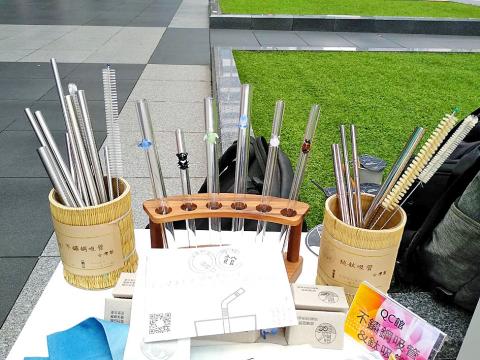Single-use plastic straws will no longer be available at a wide range of venues in Taiwan from Monday as part of a government effort to limit ocean pollution, the Environmental Protection Administration (EPA) said on Wednesday.
The ban is to take effect at government agencies, public and private schools, department stores and shopping malls, as well as for onsite use at chain fast-food stores, the EPA told a news conference.
First-time violators will not be punished, but if they breach the regulations again, they would face a fine of NT$1,200 to NT$6,000, the EPA said.

Photo: Liu Li-ren, Taipei Times
Take-out and delivery orders can still include plastic straws, it said.
People in Taiwan use 3 billion plastic straws per year on average, so hopefully the regulations, along with a prohibition on microbeads in personal care products, would help reduce marine pollution and mitigate the harm to ocean creatures, EPA Minister Chang Tzi-chin (張子敬) said.
On July 1 last year, Taiwan banned the production and import of personal care products containing plastic microbeads.
Fast-food chain KFC stopped offering plastic straws at its restaurants in Taiwan on June 11, while McDonald’s banned plastic straws at its outlets in Taipei on April 22 and said that its restaurants nationwide would follow suit by the end of this month.

Nipah virus infection is to be officially listed as a category 5 notifiable infectious disease in Taiwan in March, while clinical treatment guidelines are being formulated, the Centers for Disease Control (CDC) said yesterday. With Nipah infections being reported in other countries and considering its relatively high fatality rate, the centers on Jan. 16 announced that it would be listed as a notifiable infectious disease to bolster the nation’s systematic early warning system and increase public awareness, the CDC said. Bangladesh reported four fatal cases last year in separate districts, with three linked to raw date palm sap consumption, CDC Epidemic Intelligence

The manufacture of the remaining 28 M1A2T Abrams tanks Taiwan purchased from the US has recently been completed, and they are expected to be delivered within the next one to two months, a source said yesterday. The Ministry of National Defense is arranging cargo ships to transport the tanks to Taiwan as soon as possible, said the source, who is familiar with the matter. The estimated arrival time ranges from late this month to early next month, the source said. The 28 Abrams tanks make up the third and final batch of a total of 108 tanks, valued at about NT$40.5 billion

Two Taiwanese prosecutors were questioned by Chinese security personnel at their hotel during a trip to China’s Henan Province this month, the Mainland Affairs Council (MAC) said yesterday. The officers had personal information on the prosecutors, including “when they were assigned to their posts, their work locations and job titles,” MAC Deputy Minister and spokesman Liang Wen-chieh (梁文傑) said. On top of asking about their agencies and positions, the officers also questioned the prosecutors about the Cross-Strait Joint Crime-Fighting and Judicial Mutual Assistance Agreement, a pact that serves as the framework for Taiwan-China cooperation on combating crime and providing judicial assistance, Liang

Reports of Taiwanese going missing, being detained or interrogated, or having their personal liberties restricted in China increased about fourfold annually last year, the Mainland Affairs Council (MAC) said yesterday. Last year, 221 Taiwanese who traveled to China were reported missing, were detained and interrogated, or otherwise had their personal freedom restricted, up from 55 the previous year, the council said. Reopening group tours to China would be risky, as it would leave travelers with no way to seek help through official channels after Beijing shut down dialogue between the associations tasked with handling cross-strait tourism, the MAC said. Taipei’s Taiwan Strait Tourism